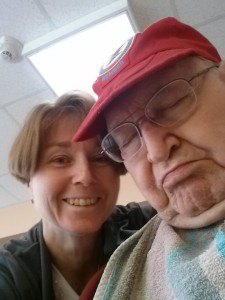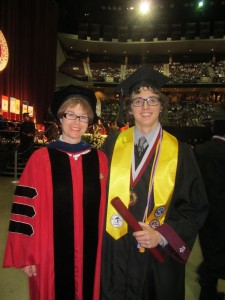I was asked what journey I took to go from writing software back into a tenure-track appointment.
A short answer would be that I have been very fortunate in my misfortunes; perhaps good at making lemonade out of lemons.
Here is a longer answer, still greatly abbreviated, omitting several years of unhappiness, discouragement and failures, and the unhappiness, discouragement and failures that were interleaved with the successes. I will mention in my first 4 years of teaching, during 3 of which I was not even full-time, I taught 10 different undergraduate courses from freshman to senior level. Starting over new every semester was hell, but it certainly established that you can throw me into a class almost at random, and I will make it a success.
As I found my stride with teaching, I was lucky that one of courses here rejected by the tenure track faculty was mathematical modeling, and inevitably, I got assigned to teach it along with two other new courses that year — as if the one difficult new course wasn’t enough on its own. I took a summer’s worth of anxiety medication trying to figure out what in the hell one would do with that course — projects, obviously, but what and how and … ???? It certainly didn’t help that everyone I talked to told me that this was one of the most difficult courses if not the most difficult course they had ever taught and that they were glad I was teaching it and not them. I figured if I wanted to teach a senior level course, I better be good at this, and I better like it. No pressure! I went to the Course Design Series offered by our Center for Teaching Effectiveness which reminded me to design around what I wanted students to learn. Apparently I had some good ideas.
I also think I just kept getting lucky. I acquired a talented undergraduate and independent thinker in the first iteration of that course, who became my undergraduate research student. He’s an electrical engineer in alternative energy (solar hot water heating), with a double major in mathematics. I was the one encouraging him to continue doing what he was doing, and lo, I became his research mentor. He wrote an undergraduate thesis, won some nice scholarships and awards — we had a great three years together. I will miss him to pieces when he graduates this year.
Through the modeling class, I mentored some smaller undergraduate research projects that could go to Student Research Week, or MathFest, in our undergraduate journal, or to a Writing Center competition. Simply encouraging students to submit their work when I see them doing something interesting makes such a huge difference.
I talked two young women who did interesting projects in my class into presenting at MathFest, and that meant I had to go myself. I talked about the writing I have students do in the modeling course. The session I was in led me to an opportunity write an article on that topic. This has been accepted to the journal PRIMUS. I have plenty more ideas that can go in PRIMUS. I just have to find time to work/write them up.
I never would have guessed how much fun it is to take students to conferences; seeing things through their eyes, taking them somewhere fun for lunch, going to talks with them. Up until that point, I had sometimes hated, sometimes tolerated, but I had never enjoyed a math conference. I overheard my two talking about not understanding a talk, and rather than being intimidated like I would have been, they were peeved that the presenter didn’t define his terms. Conclusion: it was a lousy talk. Go team! I helped teach them that as we learned how to put together presentations.
Ever since going to MathFest, I’ve gotten together with those two several times a semester for lunch. They are now finishing their master’s degrees, one in the Bush School, one in Wildlife in Fisheries.
The professor in Wildlife and Fisheries Science who advises my student had earlier worked with me to design a project for my class since he does a lot of mathematical modeling. This has grown, in turn. He puts me in his grant applications for attracting female mathematically talented students, and he and I are working on a project and getting some more ideas for publications together.
That puts together a track record of successful teaching, mentoring undergraduate research, and miracle of miracles, I was even on track to cobble together a scholarship program for me.
I was also lucky that I befriended the first woman tenured in the Math Department. We started talking because she’s been teaching writing in mathematics classes for years. We have lunch together once a week. Add to that some good/bad luck in that the department has been particularly dysfunctional in my direction this year when my credentials are strong.
She has been the best mentor ever, encouraging me, always happy to look over my materials and make comments and, most importantly, tell me when they were good and that she thought I would be successful. 5 tenure track campus interviews and two offers later, and we conclude she was right about that. I think I would have found the courage to apply on tenure track without her, but her encouragement and ready assistance made certain of it. I will never be able to pay her back, but I sincerely hope I have been paying and will continue to pay it forward to my own students in the future.


